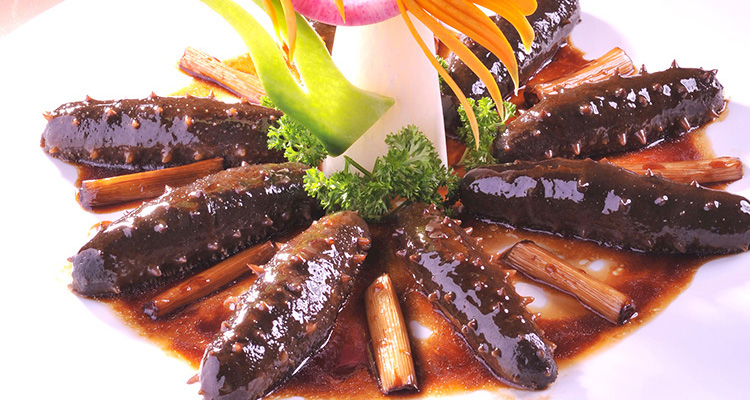Beijing Cuisine: Sea Cucumber Braised with Scallions
When plump sea cucumbers are slowly simmered in fragrant scallion oil, their soft flesh quivers under a glossy dark-brown sauce. As you lift a piece, strands of amber-colored glaze stretch like honey — this is Scallion Braised Sea Cucumber, a legendary treasure of Beijing cuisine. More tender than French escargot and more flavorful than Italian seafood risotto, this dish has long been considered the crown jewel of traditional Chinese banquet dishes.
1. Origin and History
This dish originated in Shandong cuisine (Lu cuisine) and was introduced to Beijing during the late Qing Dynasty as part of the imperial court menu. In the Republic of China era, renowned chefs from the famous “Eight Grand Restaurants” adapted it by using locally grown Beijing scallions instead of Shandong scallions, creating a richer Beijing-style flavor. Today, it remains the showpiece dish at high-end Beijing banquets.
2. Cultural Significance
For Beijingers, this dish is the ultimate gesture of hospitality for distinguished guests. There’s a saying: “No banquet is complete without sea cucumber.” Especially at business banquets and wedding feasts, serving Scallion Braised Sea Cucumber symbolizes the host’s utmost respect. In Chinese, the word for “sea cucumber” (shēn) sounds like “rise” (shēng), carrying wishes for good fortune and promotion.
3. Key Ingredients
Only wild spiky sea cucumbers from the Liaodong Peninsula are used, each with at least six rows of spikes. The scallions must be the white stalks of Zhangqiu scallions from Shandong, each up to 50 cm long. The broth is made by simmering old hen, Jinhua ham, and dried scallops for 8 hours, and the dish relies on a secret house-made scallion oil.
4. Cooking Process
The dish takes three days to prepare. The sea cucumbers are rehydrated over two days, then gently simmered until tender. Scallion oil is made by frying scallion whites and roots separately. Finally, the sea cucumbers are braised in the rich broth and scallion oil for 2 hours. The sauce is thickened by drizzling in starch slurry three times until it becomes honey-like before serving.
5. Flavor and Texture
The sea cucumber is bouncy like gummy candy yet silky like pudding, melting gently in the mouth. The scallion aroma is rich but not harsh, and the sauce is savory with a hint of sweetness, leaving a lingering umami aftertaste. Its gelatinous coating clings to the lips without being greasy — every bite is a gift from the sea.
6. How to Eat
Always eat it with a spoon, scooping up both the sauce and the sea cucumber, and pair it with plain white rice for an authentic experience. Food lovers often taste it plain first, then add a dash of aromatic black vinegar for brightness. Side dishes like stir-fried pea shoots or chilled cucumber salad help balance the richness.
7. Where to Try It
Highly rated restaurants on Dianping include Fengze Garden (a historic Lu cuisine brand), Cui Hua Lou (creative techniques), and That Little Restaurant (private-style flavors). Expect to spend around ¥200–500 per person. It’s best to book in advance. When ordering, ask for it to be “braised extra soft” if you prefer a melt-in-your-mouth texture.
8. Travel Tips
The English name of this dish is “Scallion Braised Sea Cucumber.” The best season to enjoy it is autumn and winter when sea cucumbers are plumpest. If you don’t eat seafood, many restaurants offer vegetarian mock sea cucumber versions. Some also serve single-portion plated versions that are perfect for solo travelers.
9. Easy Home Version
At home, you can use ready-to-eat rehydrated sea cucumbers. Simmer them in chicken broth with chunks of scallion for 20 minutes. Thicken with a cornstarch slurry and drizzle with scallion oil at the end. While it won’t match the restaurant version, it still captures much of the essence.
Let this amber-glazed ocean delicacy add a touch of luxury to your Beijing food adventure! From the moment you lift the clay pot lid and smell the intoxicating scallion aroma to the first bite that melts on your tongue, it’s a feast of pure indulgence. Don’t forget to mix the rich sauce into your rice — this unforgettable flavor will be the highlight of your Beijing culinary journey!


